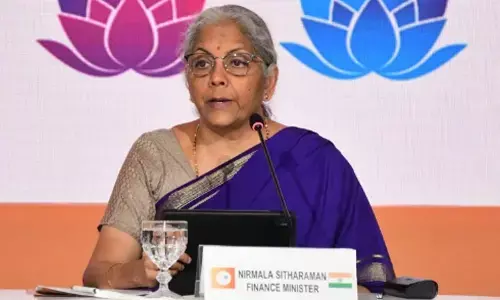Inculcating leadership qualities

Inculcating Leadership Qualities, the perfect leader for his times, may all times according to the Indian ideology
.jpg) Time for Sri Rama Navami and our state, in fact our country is immersed in chanting the greatness of this mythological hero, the perfect leader for his times, may all times according to the Indian ideology. On the other side, I see the election fever and the desperate hunt by the common man, who is now a slightly politically conscious entity, for someone who is close enough to be called a competent leader in our current democratic setup. Maharaja Sivaji, Swami Vivekananda, Mahatma Gandhi, Pundit Nehru, A P J Abdul Kalam, P V Narasimha Rao, Nelson Mandela, Narayana Murthy of Infosys, B R Ambedkar, Raja Ram Mohan Roy, J R D Tata … my mind’s eye sees many true leaders from different ages and different fields, people who could assert their ideology, personality, be seers or visionaries, put the greater good before their individual progress or personal goals, communicate their thoughts convincingly through their actions rather than mere words, inspire by walking the talk. And I am reminded that times have changed and that now we need not just rare and extraordinary leaders who are born that way but more and more citizens from all categories and strata with more leadership qualities which need not be inherited but can be developed in our youth through right encouragement and environment in the growing years .
Time for Sri Rama Navami and our state, in fact our country is immersed in chanting the greatness of this mythological hero, the perfect leader for his times, may all times according to the Indian ideology. On the other side, I see the election fever and the desperate hunt by the common man, who is now a slightly politically conscious entity, for someone who is close enough to be called a competent leader in our current democratic setup. Maharaja Sivaji, Swami Vivekananda, Mahatma Gandhi, Pundit Nehru, A P J Abdul Kalam, P V Narasimha Rao, Nelson Mandela, Narayana Murthy of Infosys, B R Ambedkar, Raja Ram Mohan Roy, J R D Tata … my mind’s eye sees many true leaders from different ages and different fields, people who could assert their ideology, personality, be seers or visionaries, put the greater good before their individual progress or personal goals, communicate their thoughts convincingly through their actions rather than mere words, inspire by walking the talk. And I am reminded that times have changed and that now we need not just rare and extraordinary leaders who are born that way but more and more citizens from all categories and strata with more leadership qualities which need not be inherited but can be developed in our youth through right encouragement and environment in the growing years .
I wish to stress on the distinction between natural leaders and the inculcation of leadership qualities in general. There are some things which nature gives and there are many other things which nurture endows us with. The market seems to guide the common man’s thinking into believing that management and leadership are synonymous, that a few workshops in business management can create wonders or that it is only the high achievers who can be good leaders etc. Leadership is a desirable trait which brings remarkable outputs in any field, which is not limited to any gender, caste, community or creed. When hierarchical forms of management have been replaced by participatory, inclusive setups, we are looking for people with open mindedness, good communication skills, empathy, emotional intelligence, adaptability, analytical and problem solving skills as well as the commitment to work under pressure, so to say, meet challenges with a positive outlook. In a nutshell, leadership qualities are made up of these basics along with a thorough understanding of any issue and the integrity in character which inspires trust among the groups, teams, organisations or communities in which the person works. Are these traits hard to acquire? Are these impossible to be cultivated? Is it not possible for our education system to include these values into the learning experiences of millions of our impressionable youth? This is my concern and I am confident that much can be achieved if our educators take note of this need.
Instead of transferring the responsibility to a few business schools at the terminal level to boast of grooming ‘leaders’ our higher education must accept this daunting challenge. Higher education is tasked with developing the next generation of leaders, who will lead our modern society. As the modern world experiences constant transformation which is particularly evident in the context of globalisation and dramatic demographic changes, our society is inexorably becoming more diverse. Universities should accept this vital duty to develop students from diverse backgrounds as leaders. To respond to the complex challenges in our modern times, a specific focus on the intersection of leadership and diversity is critical. Developing the leadership capacities of the diverse students not only creates our future national leaders but responds to the mandates within many institutional missions.
In the diverse background of college students and the increasing diversity, what are their present opportunities as well as challenges? The seemingly intractable inequality in educational and economic attainment for citizens of different racial and ethnic and socioeconomic backgrounds is one of these challenges with profound social implications.
Institutions of Higher learning have to mirror our society and force for social change. Colleges and universities have to play notable part in teaching social problems. These problems can be effectively solved by cultivating students’ leadership. Hence campus administrators and educators are expected to create suitable environments where students will develop their leadership, Knowledge, skills and values.
The diverse background of the students and increasing diversity in our Indian society are important consideration in developing college students into leaders of society that can make a positive difference. In order to respond adequately we have to make a concerted effort and formulate what contributes to build up leadership among our students. The leadership perspectives of students with diverse back grounds; the policies, programmes and practices that are effective in developing all students into future leaders.
In spite of our efforts, there are varying degrees of gender disparity (11.02 females, 15.25 male) inter-religious group disparity (Muslims 8.19 to, Hindus to, Others 30.87, Rural poor 1.3, Urban poor 5.51, Rural non – poor 7.12, Urban non – poor 27.15, S.T 5 to, S.C 7.5, OBC 31.34, Others 24.89). The challenge for leadership educators is to discover how to develop in all, not simply in some, students’ ability to lead. A small, elite group of individual leaders does not hold the answer to complex challenges of our communities face today. Days have gone when a single leader solving these problems was possible, today we feel solutions arise only when all individuals have the capacity and desire to participate and be ready to lead when necessary. I am reminded of how in a flight of geese, the leader moves back and gives place to a more energetic team mate from time to time, without clinging to the ‘human illusion’ that being a ‘leader’ is an honour which cannot be shared or withdrawn.
Before entering the real world of challenges, youngsters spend a considerable period in schooling and that is the right time when educators should impart leadership traits. While inculcating leadership qualities we have to think how to develop leadership capacity, how to measure the outcomes among students, how to frame the concepts. If educators define leadership as the sole activity of potential leaders, they will miss the diverse range of students influencing the campus, community, and global world. The evolution of leadership attention to student outcomes, and increasing demand for effective leaders presents the opportunity to reexamine the policy and practices for cultivating leadership capacity within students of diverse backgrounds to meet the needs of a changing world.








